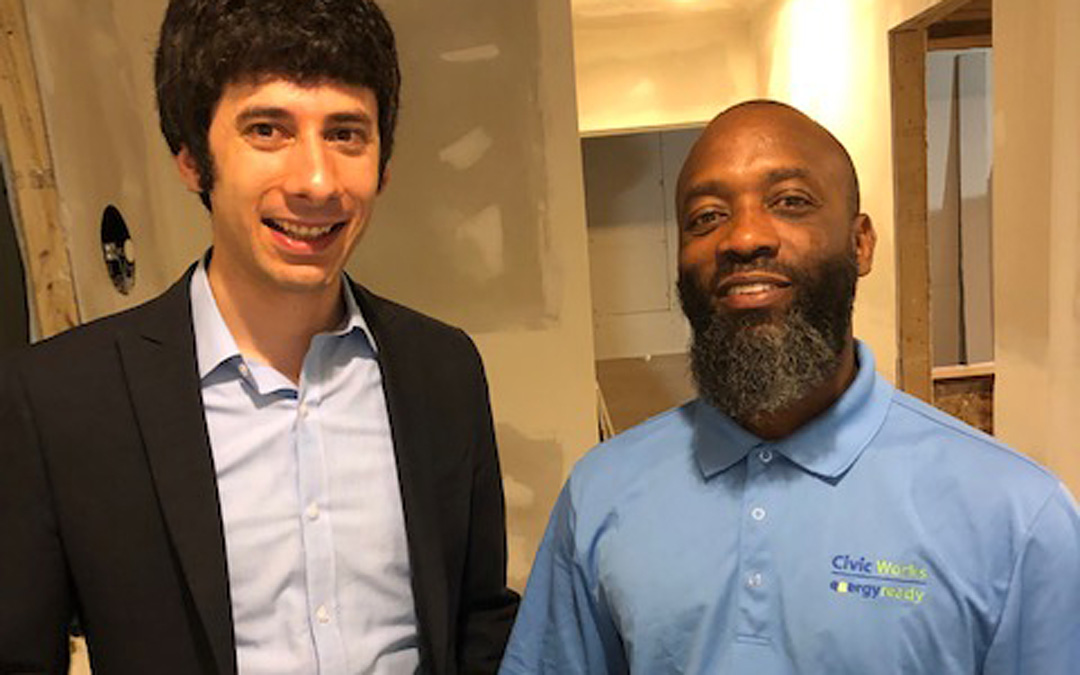Since founding Civic Works in 1993, Del. Dana M. Stein (D-11th) has taken great pride in the myriad accomplishments of the nonprofit, which strives to strengthen Baltimore’s communities through education, communal service and skills development.
In particular, Stein, who is Civic Works’ executive director, is proud that his East Baltimore-based organization’s Center for Sustainable Careers — formerly known as the Baltimore Center for Green Careers — recently enrolled its 1,000th participant. This year marks the center’s highest number of incoming participants — 133.
The center’s mission is to find jobs and train unemployed and underemployed residents in four environmentally friendly careers: solar energy installation, storm water management, environmental remediation and home energy efficiency.
“We established the center in 2003 because we saw the need to build pathways to family-sustaining careers in rapidly growing sectors of Baltimore’s economy,” Stein said. “The center is innovative in its strategies for building deep relationships with employer partners and has demonstrated a track record of supporting the long-term success of graduates.
“Ninety-two percent [of CSC participants] have been incarcerated, which makes it very hard for them to find work. Through CSC, almost all are placed in construction jobs,” he said. “The center is housed in a 25,000-square-foot building in East Baltimore that has classrooms, workshops, administrative offices and a warehouse. With the expanded training center, I am excited for them to continue to grow by serving greater numbers of Baltimore residents and training for careers in new areas.”
Jmore recently spoke with Eli Allen, CSC’s director, and Tyrell Armstrong, a CSC graduate who teaches at the center.
Jmore: How exactly does CSC work?
Allen: We build deep employer-employee relationships by putting participants on our payroll for two-to-six months as they go through classroom and hands-on training. They must meet our requirements before we send them into the field. There is never a gap between being on our payroll at minimum wage and getting a construction job through us. The highest average wage is $15.88
Our placement rate is 94 percent, and our retention rate after two years is 92 percent. We have a full-time retention specialist on staff, as well as two licensed social workers, plus our graduates act as mentors to the participants. We also have case managers who work with participants in many ways, for example, by helping them get driver’s licenses. All of us give these participants some assistance to get out of a hole.
Who employs CSC participants?
Allen: We are an excellent source of employees for many companies in the construction industry and have worked with some employers for 10 years. In fact, construction companies send workers to us to get different credentials for both classroom knowledge and hands-on training. Most of our employer partners in the construction industry are for-profit. Our goals are to improve retention rates and career advancement. We also secure construction contracts on our own, and we give some of this work to our employer partners.
How do you determine when CSC participants are ready for work?
Armstrong: We have classes for construction credentials and we also have hands-on training. We give many tests and so does Baltimore City Community College.
I began as a weatherization installer. Then, I expanded to do energy audits in houses so I could tell homeowners what needs to be done for their homes to be more energy-efficient. Now, I do quality checks two days a week. The other days, I do hands-on training in classes of 10-15 participants, and I do lots of testing.
How did you get involved?
Armstrong: After high school, I had a construction job, but then I became unemployed and was unable to find work. I was angry and sad. Then in 2014, I attended an information class and I’ve been here ever since then.
What would you do if you weren’t here?
Armstrong: Honestly, if I was not involved here, I don’t know what I would do.
What does the program need to be successful?
Allen: We need more women to be participants. Most women don’t apply for construction programs, but we do have some women graduates. We work with other programs as partners and want to do more of this for Baltimore residents.
What does this job mean to you personally?
Allen: The mission of this work really speaks to me. There are great disparities in the system. We need to do more work to create equity for the residents of Baltimore, for the stability of their family life. We are only one small part of the solution. We need more programs like this.
For information, visit https://civicworks.com/portfolio/center-sustainable-careers/.
Peter Arnold is a Silver Spring-based freelance writer.





